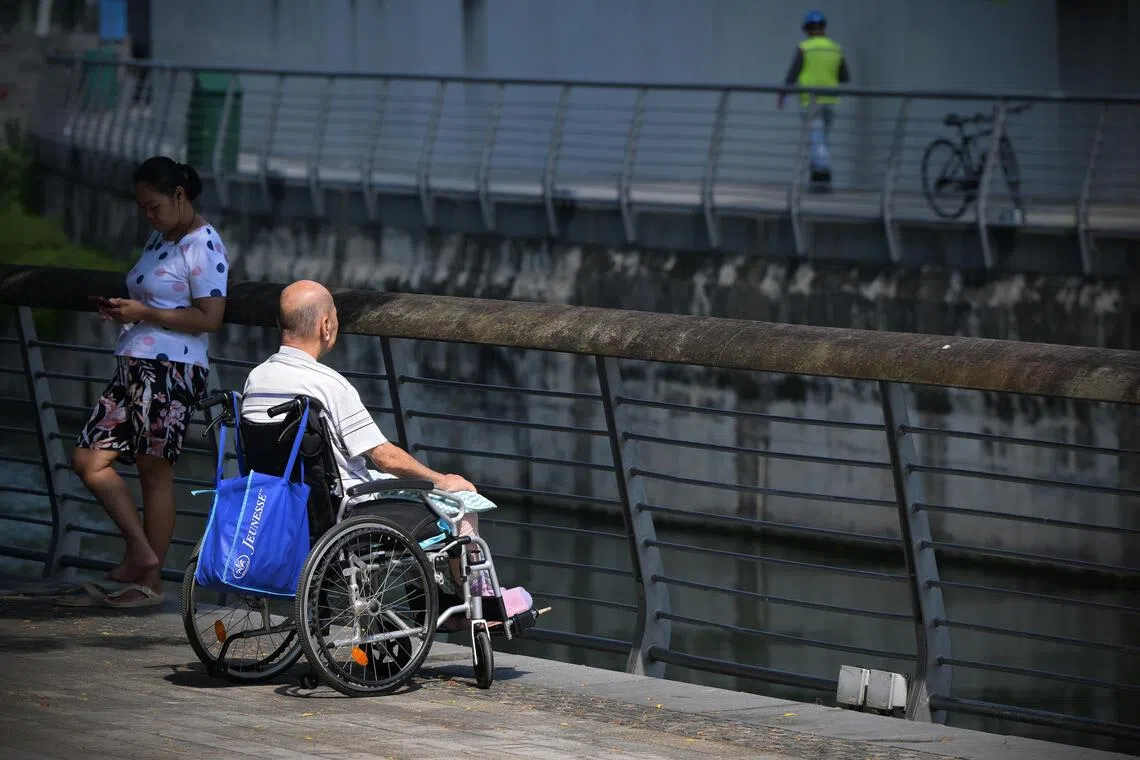News analysis
Breaking the silence on financial abuse of the elderly before it breaks them
Sign up now: Get ST's newsletters delivered to your inbox

A wider societal effort will help to raise public awareness of elder financial abuse, and signal to seniors that help is available.
ST PHOTO: NG SOR LUAN
- Elder financial abuse in Singapore is a hidden problem, often by children, with seniors reluctant to report due to fear and shame.
- But the silence allows the abuse to continue unchecked.
- Public education and community intervention are needed to change mindsets, encourage reporting, and help both seniors and abusers.
AI generated
SINGAPORE - Elder financial abuse thrives in the shadows, and one of its strongest enablers is the veil of silence surrounding the problem.
Seniors suffer in silence for years, often because the abusers are their own children.
Some are physically hit for refusing monetary demands, while others find, to their horror, that their bank accounts have been emptied by their loved ones.
The seniors may pass their ATM card to a family member to help them withdraw money, or they have a joint account with their child, who takes the money without the senior’s knowledge or consent.
In Singapore, elder financial abuse remains a hidden, under-reported problem
The Republic’s rapidly ageing society means a growing pool of seniors are potentially vulnerable to being exploited when their mental capacity declines with age or illness.
Amid this grim reality, the banking sector is developing new industry guidelines
But seniors must speak up.
Keeping mum will only normalise abuse and suggest that it is acceptable.
A wider societal effort will help to raise public awareness of elder financial abuse, and signal to seniors that help is available, even if they are hesitant to speak to their own family members.
Normalising the abuse perpetuates it
Among abuse victims, such as spouses and children, social workers note that seniors are the most reluctant to speak up against violence.
This is because they fear getting their children into trouble with the law, losing the relationship or feel too ashamed to seek help.
Some even tell social workers they would rather die at their child’s hands than report them to the authorities.
Mr Martin Chok, Care Corner Singapore’s deputy director of family and community services, said some seniors try to “normalise” the abuse as a coping mechanism.
This condones the abuse and perpetuates it, he said. The abuse often escalates over time as the children realise their behaviour yields their desired outcomes, removing any impetus for change.
Ms Violet Yang, head of Touch Community Case Management at Touch Community Services, added that silence only empowers abusers, as they know they can get away with their actions.
Other seniors also then see that the usual response to abusive behaviour is one of inaction.
So, they feel resigned to their fate, or internalise the belief that nothing will change even if they report the abuse, she said.
Breaking the silence
There are no easy solutions or quick fixes to tackle the complex issue of elder financial abuse.
And with a growing elderly population, conflicts and complications may arise around seniors’ care and finances if they lose their mental capacity due to age or illness.
The latest population statistics
Social workers like Ms Yang said clear legal definitions and enforceable laws are needed to prevent seniors from being financially abused.
She highlighted the Professional Deputies and Donees scheme, which allows individuals to hire a professional donee, such as a social worker or lawyer, to make decisions on their behalf if they later lose mental capacity.
This scheme is especially useful for individuals who do not have family members who are willing or suitable to act as a donee or deputy, she said. Touch Community Services has a team of professional deputies and donees.
Such an arrangement is formalised through a legal document known as the Lasting Power of Attorney (LPA). If a person does not create an LPA before losing mental capacity, the courts can appoint a professional deputy to manage their affairs.
Beyond any proposed measure, a fundamental shift in mindset is paramount.
Seniors’ ingrained belief that abuse is normal or must be tolerated needs to change.
Greater public education could encourage them to break the silence, said Care Corner Singapore’s Mr Chok, noting that reframing the issue may prompt seniors to seek help.
He said many seniors think reporting abuse would harm their children.
But the issue could be reframed as seeking help actually helping their child by addressing the underlying issues that result in the abuse, with the help of professionals.
Even if seniors hesitate to approach the authorities, they may confide in a neighbour, friend or relative, highlighting the need for community-level intervention.
For example, Touch Community Services has been training residents to befriend vulnerable neighbours, to spot signs of abuse and to refer them for help. The idea is that residents can be the first to spot if anything is amiss, said Ms Yang.
More broadly, since 2020, the Ministry of Social and Family Development has trained more than 11,000 individuals
In May, UOB started training its branch staff to spot and support customers who may be facing financial abuse by a family member.
DBS/POSB and OCBC banks have also trained branch staff to identify and manage vulnerable or at-risk clients, such as those facing cognitive decline, undue influence or pressure from their loved ones.
The banks’ efforts and vigilance are critical in keeping seniors’ money safe.
But the challenge is not only to introduce or tighten safeguards against elder abuse, but also to break the silence that allows such abuse to fester.



